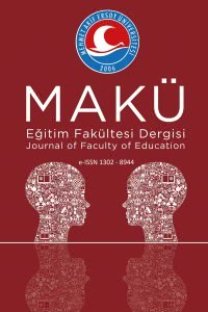Philosophies, Models and Common Trends of Teacher Education and Alternative Perspectives
Bu makalede üç temel öğretmen yetiştirme felsefesi incelenmekte ve bunlardan pratik bilim olarak öğretmen yetiştirme olarak adlandırılabilecek olan 'yorumbilimsel' görüşü ön plana çıkmaktadır. Bunu takip eden, üç öğretmen yetiştirme modeli tartışması bu modellerin temelinde yatan felsefi rasyoneli ortaya koymakla birlikte fesefi akımların bu modelleri nasıl etkilediğini de sergilemektedir. Öğretmen yetiştirme alanında önde gelen akımların karşılaştırmalı analizi öğretmen yetiştirmenin olası geleceğini göstermektedir. Fakat, sonuçların hiçbir yerde tatmin edici olmadığıda çok açıktır. Bu yüzden makale, yeni fikirler verebilmek ve öğretmen eğitmenlerini farklı düşünmeye sevk edici alternatif bakış açılı bir tartışmayla devam etmektedir. Makale içerisinde yapılan tartışmaların neticesinde şu temel fikir ortaya çıkmaktadır: uygulanan öğretmen yetiştirme modeli her ne olursa olsun, eğitim fakülteleri ve uygulama okulları arasında daha güçlü ve etkili iletişime ihtiyacımız vardır. Makale öğretmen eğitmenlerini, öğretmen eğitimi olarak adlandırılabilecek bir bilim dalının olup olmadiğını kanıtlayıcı bir çağrıyla sona ermektedir.
This article examines three main teacher education philosophies and favours the 'hermeneutic view' of teacher education as a practical science. The discussion of three teacher education models that follows sets out the philosophical rationale behind such models and demonstrates how philosophical perspectives affect teacher education models. The comparative analysis of common trends in teacher education demonstrates the possible future of teacher education. However, it is also apparent that the result is nowhere satisfactory. Hence, the discussion of alternative perspectives follows in order to provide fresh and challenging ideas for teacher educators. As a result of all the discussions made in the article the idea emerges that whatever the teacher education model, we need stronger and more effective ways of collaboration between faculties of education and schools. The article then ends with a challenging call to teacher educators to identify if there is a scientific field of study that can be called teacher education.
- ISSN: 1302-8944.
- Yayın Aralığı: Yılda 2 Sayı
- Başlangıç: 2018
Sayıdaki Diğer Makaleler
Yetiştirme Yurtlarında Kalan ve Aileleriyle Yaşayan Liseli gençlerin Stresle Başaçıkma Stratejileri
Amour,Masque, Secret Dans Les Chouanse de Balzac
Georges Lukacs ve Tarihsel Roman
Yazınsal Metinlerde Göstergebilimsel Uygulamaya Artsüremli Bir Bakış
Öğretimde Planlama ve Değerlendirme Dersine İlişkin Öğrenci Görüşleri
Burdur İli'inde Nüfus Hareketleri
Yedinci Beş Yıllık Kalkınma Planı Döneminde Eğitimde Kaynak Sorunu
7-11 Sınıf Öğrencilerinin Yerçekimi Konusundaki Kavram Yanılgıları
